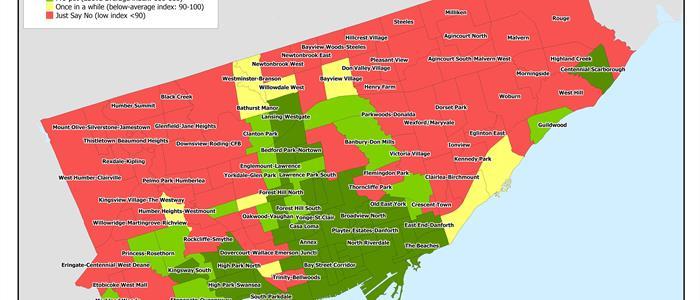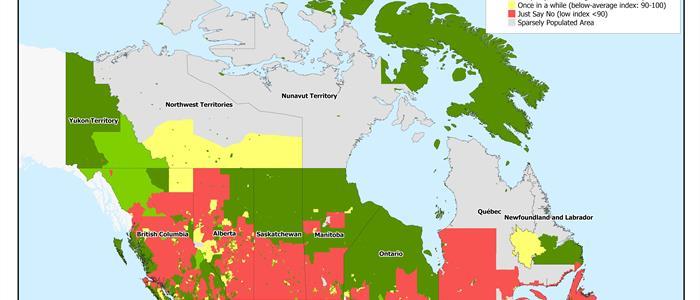
Legalize It: Canadians Who Support Legalizing Marijuana
There has been a lot of buzz in the news recently regarding the legalization of marijuana, much of it brought on by Liberal leader Justin Trudeau. During a recent campaign stop in Vancouver, he stated, “Decriminalization is a great first step [but] I’m in favour of legalization as well, because we control it, tax, and regulate it. We allow for development of a medical marijuana industry.”
Trudeau’s bold stance has prompted many professional and armchair pundits to once again debate this divisive and recurring theme in Canadian politics. Peter McKay and the Conservative Party have chimed in, taking the opposite side, stating that “[the] government has no intention of legalization.” In response, Trudeau contends, “The Conservatives base their approach on ideology and fear. I prefer to base my approach on evidence and best practices, and I think that is what Canadians will respond to.”
In the wake of this debate, the time seemed right to look at how Canadians responded when asked if marijuana should be legalized in Canada. Using a combination of data from a national survey conducted by the Print Measurement Bureau (PMB) and EA’s popular PRIZMC2 segmentation system, we can connect the dots to see how different segments of Canadians feel about legalizing pot.
According to PMB, 30.5% of Canadians agreed that using marijuana should be legalized, while 42.1% disagreed. The remaining 27.4% had no opinion, refused to answer, or were more interested in finding some munchies (just kidding about that last one).
Based on location, residents in Victoria (BC), Kelowna (BC), Thunder Bay (ON), Saskatoon (SK), and Winnipeg (MB) most strongly favour legalization among Canada’s largest markets. (See table below.) Meanwhile, the residents of large metropolitan areas, such as Toronto (ON) and Vancouver (BC), are less likely than average to favour legalization. This somewhat surprising result may be due to the wide diversity of values present in these multicultural cities.


With PRIZMC2, the segmentation system that classifies Canadians into 66 lifestyle types, we can analyze the various segments of Canadian society favouring or opposing legalization, and then group them into major categories based on common characteristics. We found four distinct groups of Canadians who believe pot should be legalized: Younger Educated City Dwellers, Downscale Urbanites, Middle-Class Families Outside of Major Cities, and Country Families. On the flip side, three groups of Canadians oppose legalization: Suburban Chinese and South Asian Families, European Immigrants in Major Cities, and Francophone Households in Suburbs and Towns. An additional group, Wealthy Educated City Dwellers, display mixed feelings on the issue.
Let’s take a closer look at who these Canadians are and what their lifestyles might have to say about their points of view.
For Legalizing Pot:
Younger Educated City Dwellers – This group consists of university students and young professionals who lead a hip, progressive lifestyle. They frequent nightclubs, bars, theatres and art galleries.
Downscale Urbanites – A disproportionate number of recent immigrants, students and single-parent families are members of this group. Similar to the first group, their lifestyle reflects activities of the young and restless; they go out to bars, dance clubs and concerts.
Middle-Class Families Outside of Major Cities – This group consists of suburban households close enough to commute to city jobs by GO train. Residents tend to be married, middle-aged couples and families with high school and college-aged children.
Country Families – Found in small towns and rural communities, households of this group tend to be Caucasian, middle-aged couples, families, and retirees who live on farms or in moderately sized houses and mobile homes. They like to spend their leisure time fishing, hunting, golfing and boating.
Legalization Support Across Canada
Against Legalizing Pot:
Suburban Chinese and South Asian Families – This fast-growing group is filled with recent immigrants from China, India, Pakistan and the Philippines. They are generally younger and middle-aged, and tend to hold very traditional and conservative values.
European Immigrants in Major Cities – Households in this group include high concentrations of European immigrants, especially from Italy, Portugal and Greece. Similar to the Suburban Chinese and South Asian Families, this group of middle-aged and older couples and families tend to hold traditional values.
Francophone Households in Suburbs and Towns – This group is extremely diverse, exhibiting a mix of ages, incomes, occupations, family styles and dwellings. They share a casual lifestyle and enjoy going to movies, comedy clubs and music festivals.
Mixed Feelings on Pot:
Wealthy Educated City Dwellers – Representing the elite neighbourhoods in Canada, these middle-aged and older residents are university educated and enthusiastic consumers with ambivalent feelings about legalization. However, the wealthiest within this group (the much-maligned 0.4%) indicate that they are strongly against legalization.
Legalization Support in the Toronto CMA

Among the groups in favour of legalizing marijuana in Canada, a variety of lifestyle types are evident. While some may fit the stereotypical twentysomething stoner type—playing video games, skateboarding and munching on organic granola—there’s also a strong proportion of more cultured, university-educated individuals with a taste for fine arts. In their spare time, they enjoy attending the opera, the ballet, and jazz concerts along with frequenting local museums. They also take yoga classes and play squash to stay in shape. They may watch a lot of TV, but it’s not the mindless entertainment you might expect of half-baked viewers. From nature and history specials to more thought-provoking comedies like “South Park” and the “Colbert Report,” these viewers want nothing to do with the shenanigans of Honey-Boo Boo. A significant percentage of these individuals are white-collar workers, often employed in the not-for-profit sector, who commute to work by public transit. Many are urban renters and typically very charitable. And in the all-important debate over operating systems, they tend to be Mac people—relentlessly so at times.
In terms of their values, pro-pot Canadians of all lifestyle types share a desire to experience cultures different from their own. They frequent Japanese restaurants and like to attend cultural festivals in their communities. Open-minded when it comes to alternative lifestyles, such as gay and gender-equal relationships, this group has a strong tendency to reject authority, according to the Environics Research Group Social Values survey. They question norms and have a strong desire for autonomy. They also express a strong Need for Escape, which is defined as a desire to escape the stress and responsibilities of everyday life. Contrary to the popular notion of potheads as lazy and unambitious—think Seth Rogen in “Knocked Up”—the values of pro-legalizers indicate they are hard workers with a strong work ethic. Perhaps these Canadians are so busy with their careers, education and family that they look forward to unwinding at the end of the day with their best pal: Mary Jane.
As for those opposed to legalization, they are hardly the stern “school marms” you might expect. In fact, there are fewer university-educated individuals in this group compared to both the pro-legalization group and Canada as a whole. A much larger proportion of this group completed apprenticeships and trade school educations before moving into blue-collar careers. However, just because they are against marijuana doesn’t mean that they don’t like to have a good time. They’re big fans of outdoor activities, especially family-friendly pursuits. They like to participate in team sports such as basketball and soccer in the summer and snowboarding and snowmobiling in the winter. This is also a group that loves to “shop ’til they drop”. The prospect of going shopping for any reason gets them excited, and they especially enjoy perusing the weekly advertisements in newspapers.
So why are they so averse to legalizing marijuana? One reason may be that a large chunk of this group tends to be middle-aged families who hold fairly traditional social values. They are involved in their local communities and desire to be held in high esteem and respected by others; it simply would not do if they were found slung over a couch waxing philosophical about the music of Bob Marley. Probably most revealing is that, on the whole, members of this group are not much into alcohol either. They might enjoy a glass of wine or a beer with dinner, but they do not frequent bars or nightclubs to the extent that the pro-legalization group does. They either just don’t enjoy knocking back a few or they would rather not risk tarnishing their reputation by joining in an activity that their peers might view with jaundiced eyes. Apparently, these Canadians just can’t bring themselves to let loose.

Vito De Filippis is Client Advocate in the retail, media, real estate and entertainment practice at Environics Analytics. Special thanks to Melodi Moini for maps and Hillary Barr for research assistance.



